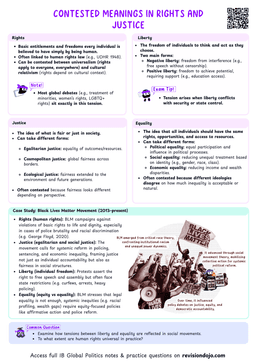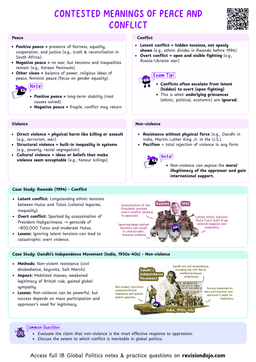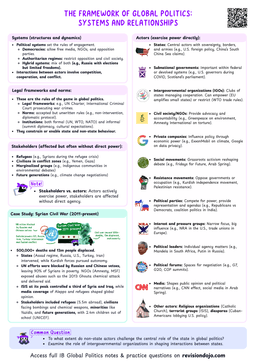Intergovernmental Organizations (IGOs): An Overview
Intergovernmental Organizations
Intergovernmental Organizations (IGOs) are formal institutions made up of two or more states that work together on common issues such as peace, security, trade, or the environment. They are established through treaties and operate under international law, meaning member states are legally bound by the organization’s rules.
Key Characteristics of IGOs
- Membership: Comprised of sovereign states as members.
- Legal Personality: Possess international legal status, allowing them to enter treaties and engage in diplomatic activities.
- Decision-Making: Operate through formal structures and processes, often based on consensus or voting.
- Scope and Mandate: Vary widely, from broad mandates (e.g., the United Nations) to specific functions (e.g., the World Health Organization).
- IGOs differ from non-governmental organizations (NGOs), which are typically private, non-profit entities that operate independently of state control.
Types of IGOs
- Global IGOs:
- Examples: United Nations (UN), World Trade Organization (WTO).
- Scope: Address universal issues like peace, security, trade, and human rights.
- Regional IGOs:
- Examples: European Union (EU), African Union (AU).
- Scope: Focus on specific geographic areas, addressing regional challenges and opportunities.
- Functional IGOs:
- Examples: International Monetary Fund (IMF), World Health Organization (WHO).
- Scope: Concentrate on specific sectors such as finance, health, or environment.
- When analyzing IGOs, consider their scope, mandate, and decision-making processes. This helps in understanding their strengths and limitations.
The Role of IGOs in Global Politics
- Facilitating Cooperation:
- IGOs provide platforms for states to collaborate on shared challenges, such as climate change, terrorism, and pandemics.
- Setting Norms and Standards:
- They establish international norms and standards, influencing state behavior and shaping global governance.
- Conflict Resolution:
- IGOs like the UN play a critical role in mediating conflicts, deploying peacekeeping missions, and promoting diplomacy.
- Economic Stability:
- International financial institutions (IFIs) like the IMF and World Bank provide financial assistance and policy advice to promote economic stability and development.
- The World Health Organization (WHO)played a pivotal role during the COVID-19 pandemic by coordinating global responses, providing guidelines, and facilitating vaccine distribution through initiatives like COVAX.
International Financial Institutions (IFIs)
International Financial Institutions
International Financial Institutions (IFIs) are a specific type of IGO focused on economic and financial issues. They play a vital role in stabilizing economies, promoting development, and facilitating international trade.
Key IFIs and Their Functions
- International Monetary Fund (IMF):
- Mandate: Ensure global financial stability by providing short-term financial assistance and policy advice.
- Functions:
- Surveillance: Monitors global economic trends and provides policy recommendations.
- Lending: Offers financial support to countries facing balance of payments crises.
- Capacity Development: Provides technical assistance and training to member states.
- World Bank:
- Mandate: Reduce poverty and promote sustainable development through long-term projects and loans.
- Functions:
- Project Financing: Funds infrastructure, education, health, and environmental projects.
- Policy Advice: Offers guidance on economic reforms and development strategies.
- World Trade Organization (WTO):
- Mandate: Facilitate international trade by establishing rules and resolving disputes.
- Functions:
- Trade Negotiations: Hosts negotiations to reduce trade barriers.
- Dispute Resolution: Provides a mechanism for resolving trade disputes between member states.
- While the WTO is not a financial institution in the traditional sense, it plays a critical role in the global economic system by regulating trade.
The Impact of IGOs and IFIs
- Promoting Global Governance:
- IGOs and IFIs are central to global governance, providing frameworks for cooperation and coordination on transnational issues.
- Balancing Sovereignty and Cooperation:
- They navigate the tension between state sovereignty and the need for collective action, often requiring states to compromise on certain aspects of sovereignty.
- Addressing Global Challenges:
- IGOs and IFIs are instrumental in tackling issues like climate change, poverty, and conflict, though their effectiveness is often debated.
- The Paris Climate Agreement, facilitated by the United Nations Framework Convention on Climate Change (UNFCCC), exemplifies how IGOs can bring states together to address global challenges despite differing national interests.
Criticisms and Challenges
- Inequality of Power:
- Critics argue that IGOs and IFIs often reflect the interests of powerful states, marginalizing smaller or developing countries.
- Bureaucratic Inefficiency:
- Some IGOs are criticized for being slow and inefficient, with complex decision-making processes that hinder rapid responses.
- Sovereignty Concerns:
- States may resist IGO interventions that are perceived as infringing on their sovereignty or domestic affairs.
- The IMF has faced criticism for its structural adjustment programs, which some argue have prioritized economic stability over social welfare in developing countries.
The Future of IGOs and IFIs
- Adapting to New Challenges:
- IGOs and IFIs must evolve to address emerging issues like cybersecurity, global health, and climate change.
- Enhancing Inclusivity:
- There is a growing call for these institutions to be more inclusive and representative of diverse perspectives, particularly from the Global South.
- Leveraging Technology:
- Digital tools and platforms can enhance the efficiency and reach of IGOs, enabling more effective collaboration and communication.
- Identify three key functions of intergovernmental organizations (IGOs) and provide examples of each.
- How do international financial institutions (IFIs) like the IMF and World Bank influence global economic stability?
- What are some common criticisms of IGOs, and how might they address these challenges in the future?



